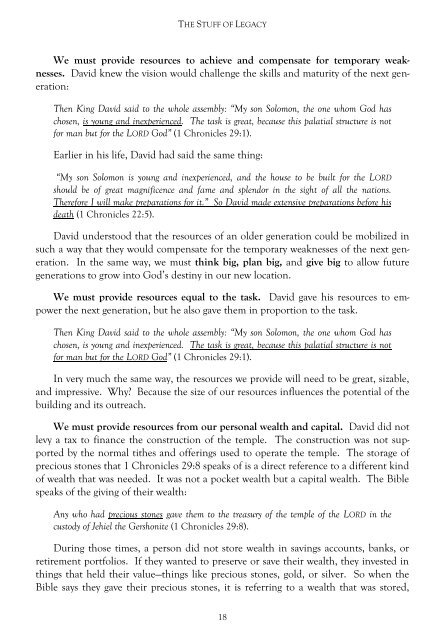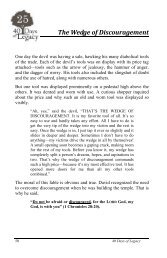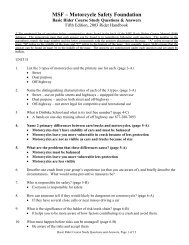GENE RONCONE
Season for Legacy Book - Highpoint Church of Aurora, Colorado
Season for Legacy Book - Highpoint Church of Aurora, Colorado
You also want an ePaper? Increase the reach of your titles
YUMPU automatically turns print PDFs into web optimized ePapers that Google loves.
THE STUFF OF LEGACYWe must provide resources to achieve and compensate for temporary weaknesses.David knew the vision would challenge the skills and maturity of the next generation:Then King David said to the whole asembly: “My son Solomon, the one whom God haschosen, is young and inexperienced. The task is great, because this palatial structure is notfor man but for the LORD God”(1 Chronicles 29:1).Earlier in his life, David had said the same thing:“My son Solomon is young and inexperienced, and the house to be built for the LORDshould be of great magnificence and fame and splendor in the sight of all the nations.Therefore I wil make preparations for it.” So David made extensive preparations before hisdeath (1 Chronicles 22:5).David understood that the resources of an older generation could be mobilized insuch a way that they would compensate for the temporary weaknesses of the next generation.In the same way, we must think big, plan big, and give big to allow futuregenerations to grow into God’s destiny in our new location.We must provide resources equal to the task. David gave his resources to empowerthe next generation, but he also gave them in proportion to the task.Then King David said to the whole asembly: “My son Solomon, the one whom God haschosen, is young and inexperienced. The task is great, because this palatial structure is notfor man but for the LORD God”(1 Chronicles 29:1).In very much the same way, the resources we provide will need to be great, sizable,and impressive. Why? Because the size of our resources influences the potential of thebuilding and its outreach.We must provide resources from our personal wealth and capital. David did notlevy a tax to finance the construction of the temple. The construction was not supportedby the normal tithes and offerings used to operate the temple. The storage ofprecious stones that 1 Chronicles 29:8 speaks of is a direct reference to a different kindof wealth that was needed. It was not a pocket wealth but a capital wealth. The Biblespeaks of the giving of their wealth:Any who had precious stones gave them to the treasury of the temple of the LORD in thecustody of Jehiel the Gershonite (1 Chronicles 29:8).During those times, a person did not store wealth in savings accounts, banks, orretirement portfolios. If they wanted to preserve or save their wealth, they invested inthings that held their value—things like precious stones, gold, or silver. So when theBible says they gave their precious stones, it is referring to a wealth that was stored,18




